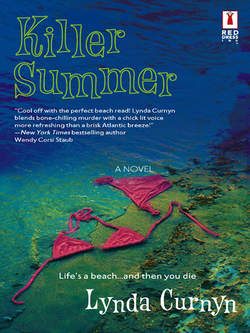Читать книгу Killer Summer - Lynda Curnyn, Lynda Curnyn - Страница 16
9
ОглавлениеMaggie
It’s like a nightmare. Only, I won’t be waking up.
That bastard. I can’t believe he’s opening the house. My house. Okay, he bought it, but he bought it for me. During the second year of our marriage. It was probably his last act of love.
Now it just seemed like a cruel joke.
Look at Sage in my kitchen. Already mixing up the pot lids and creating chaos in my recipe-filing system. Who the fuck does she think she is?
This is my house. Nothing can change that. Not even death.
Of course, that’s going to be a little hard for me to enforce. Already I could see my marigolds, the sweet little plants I’d potted on the front deck only weeks ago, dying from neglect.
It was almost too much to bear. Who am I kidding? It was too much to bear.
Maggie’s Dream was the only thing I’d ever called my own. Because the house on Fire Island was mine in a way that the apartment on E. 64th never was. The apartment was hers—Tom’s first wife, Gillian. Oh, Tom let me repaint the living room and choose new area rugs for the bedrooms, but it was Gillian who had met with broker after broker looking for the perfect home for her life with Tom. If it were up to me, I would have gone for prewar elegance, rather than reconstructed modern grandeur. But a woman isn’t supposed to complain about these things. What did I really have to complain about? In the space of a year, I had gone from a poorly heated, ramshackle two-bedroom in midtown to a triplex in one of the best neighborhoods in Manhattan.
Still, it was hard being second. I tried to explain this to Tom, but from his viewpoint, it would have been foolish to give up the apartment. He had bought it for a song back at a time when real estate values in New York weren’t as astronomical as they are now. It just wasn’t practical to sell the apartment and buy new, and Tom was, if nothing else, a practical man.
Then there was the decor. Antiques passed down through generations and deemed too precious to put away or sell off to strangers. It didn’t matter that the chandelier in the living room didn’t speak to me—it clearly was still having some cosmic conversation with Victoria Landon, Tom’s long-deceased great-aunt. Then there was the Art Deco furniture that Gillian had salvaged at antique fairs from the Hamptons to Paris. We certainly couldn’t get rid of that stuff, because, as Tom said, unique pieces such as those were hard to come by.
And Gillian, of course, no longer wanted the furniture. Why should she? She got a brand-new house in Boca Raton and an alimony settlement fat enough to allow her to move on to a whole new period of furniture.
But Maggie’s Dream was mine. Had been from the start. Well, mine and Tom’s anyway.
I remember the first time I saw the house. We had gone out late one afternoon on a Saturday when Dolores Vecchio, the broker who was working with us, called to say she had found exactly what we were looking for. I was a bit distrustful, since she had already ushered us through some less than spectacular homes in the neighboring town of Saltaire, which was Tom’s first choice since he had friends with homes there. I wasn’t fond of the houses—or Saltaire, for that matter. Too many rules. No barbecues or riding bikes at night. I mean, really, who ever heard of a beach house without barbecues or nighttime bike rides? This new place was in Kismet, and when I saw it, I felt like this house was fated to be mine.
It was so beautiful, hovering on stilts high above the ocean, as if that great swirling mass might swallow it whole. The beach had eroded a lot that year due to a hard winter, but somehow the precariousness of the house, which sat a bit too close to the crashing waves back in those days, only added to its majesty.
Of course, Tom resisted. “One good storm and that house will go right into the ocean.” But I stood firm. The house would last. It had to. I could see myself spending my summers there.
It was one of the few battles in our marriage that I won.
Now, as I watched my house infested with the very shareholders I hadn’t even wanted to take on, watched them lie about my sofas, sipping cocktails (and leaving rings on the furniture, mind you), I wondered if I had really won at all.
I felt a little like Mrs. Ramsay in To the Lighthouse, dying in parentheses.
Oh, who am I kidding? I’m no Mrs. Ramsay, despite the lovely view of the lighthouse from my house. No one would be writing books about me, least of all Virginia Woolf. No, there would be no books, no songs about Maggie Landon. Even the police had reduced me to a four-page report, which I wouldn’t exactly call lyrical. Or even just, for that matter.
I wondered if anyone would even think of me now. Or ever. Well, I knew at least one person would. Out of fear, if nothing else.
Fear of getting caught.
